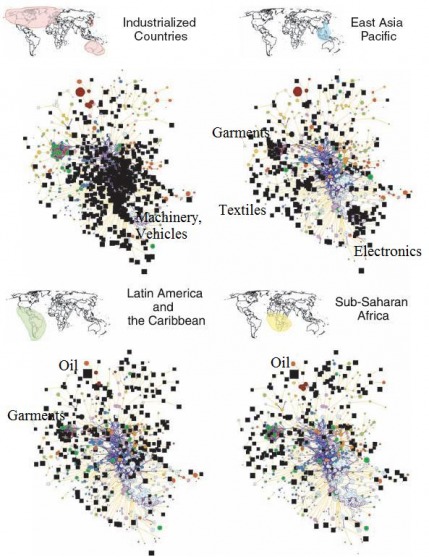|
This paper isn't new, but I recently saw Ricardo Hausman give a presentation on it, and it is quite interesting. The basic premise is that the products that countries produce can be grouped according to the inputs required to produce those products. Knowing how products related to each other could help developing economies figure out what industries to focus on. It is easier to develop industries that share production inputs with products you are already making than it is to develop industries that require a completely new set of production inputs: it is easier for monkeys to swing to a nearby tree than it is for them to swing to a farther tree. The researchers used product categories and job categories to figure out how closely different products were related to each other in terms of inputs. They then looked at several sets of countries, and mapped which products they were producing. The diagrams above show the result of this exercise: the colored dots are products, the lines connect those products that share inputs, and the black squares show what each group of countries is producing. Developed economies produce goods near the center of the cluster. The goods on that part of the map are things like electronics, that require a lot of inputs, but share inputs with a lot of other products. Developing economies are at the periphery of the map, making goods with fewer inputs, and that don't share inputs with many other goods. The point: developing economies are less diversified (no surprise) and less flexible if their main product goes bust.
I've added labels describing important product clusters for each group of countries. Developed economies are clustered around high-value, complex product manufacturing. Latin America and Sub-Saharan Africa both have oil as an important product. Asia has clusters in the areas garments, textiles, and electronics. This point about garments and textiles is interesting. Although it might seem obvious these should go together, they actually don't share many inputs. It's possible that the inputs, though not shared, have similar attributes. Perhaps they require workers with similar levels of education, even if the jobs those workers do are quite different. Or perhaps proximity matters: maybe it is cheaper to make fabric closer to where you sew it. Either way, it suggests targeting industries for development is even more complicated that the charts above suggest.
0 Comments
Leave a Reply. |
About Liz
I have worked in economic policy and research in Washington, D.C. and Ghana. My husband and I recently moved to Guyana, where I am working for the Ministry of Finance. I like riding motorcycle, outdoor sports, foreign currencies, capybaras, and having opinions. Archives
December 2016
Categories
All
|

 RSS Feed
RSS Feed
